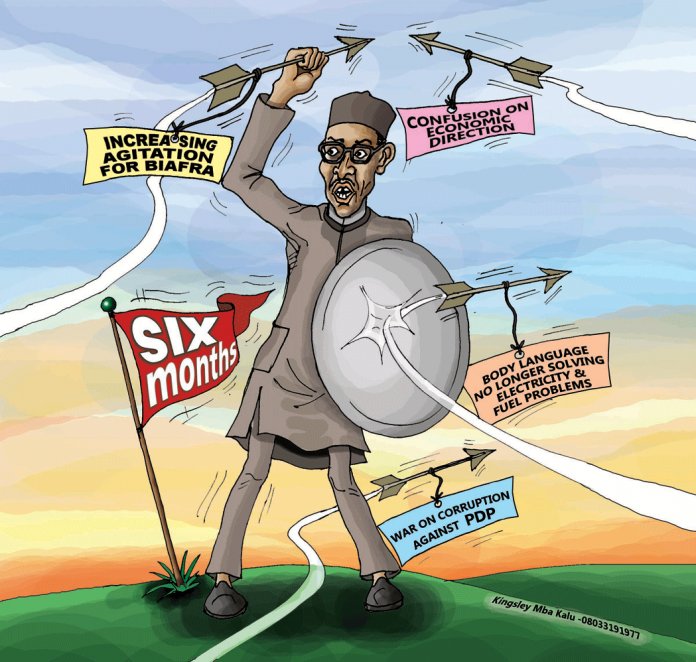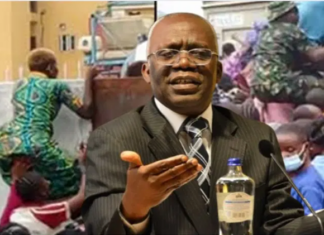Much is laid on the shoulders of Muhammadu Buhari and he brought it upon himself.
He returned to office as civilian president on May 29, partly because of his antecedents as military head of state three decades ago, and partly because of his campaign promises.
Six months later, however, the public, from Kaduna to Lagos to Enugu, is not too impressed.
Acting News Editor, Ishaya, Ibrahim, articulates the views.
Nigerians are not impressed with President Muhammadu Buhari, 180 days after he assumed office on the crest wave of optimism.
The reasons are as legion as the country is huge.
First, the talk far outweighs the walk. Or as former Kaduna State Governor, Balarabe Musa, told TheNiche, “nothing has changed. Only promises of change. As far as I am concerned, I am not satisfied with anything in the last six months.”
Revamping the bad economy which has exacerbated poverty and fuelled unemployment is the biggest problem.
Buhari’s quick fix is to give about 25 million unemployed graduates N5,000 monthly allowance. This costs N125 billion monthly or N1.5 trillion annually. Or one-third of the national budget.
Starting on the wrong foot
Former Central Bank of Nigeria (CBN) Governor, Charles Soludo, criticised the proposal in a lecture at the third anniversary lecture of Realnews magazine.
“Do we need them? Yes we do. Can we afford them at this point in time? I am not sure. I have just a few words of caution.
“First, we must avoid the pitfalls of the Western welfare system that has become a trap for many (created generations of indolent, entitlement-dependent, non-working households).
“Government must avoid institutionalising the ‘dash’ culture (a culture where people expect something for nothing). Once you start, a welfare system is not easily reversible,” Soludo warned.
Osun State Governor, Rauf Aregbesola, had funded such a populist projects at a time crude oil was selling for more than $100 per barrel.
But when oil prices plunged, the projects where unsustainable. The result was his inability to pay workers salary for more than six months in a row until the federal government intervened with a bailout.
Aregbesola was forced to truncate the projects – Opon Imon (mobile Tablets for secondary school pupils), free meals for primary school kids, and stipend for older citizens.
Analysts believe Buhari should jettison the N5,000 stipend to unemployed graduates because it is unsustainable in the face of dwindling revenue.
“He should plough the money into upgrading the healthcare system and education in such a way that the same unemployed Nigerians can access these services without spending much,” counselled Ayodele Olorunfemi, a social commentator.
Soludo also suggested a way out. “We recognise the dilemma. There is pressure to fulfil campaign promises (which are largely untenable and could bankrupt the country) versus trying to pick the pieces and put them back on a sustainable path.
“In my article in January, I stated that none of the two parties would deliver on its promises given the state of our public finance – except of course it wants to be suicidal in tipping us off the fiscal cliff ….
“Already, you (Buhari/APC) have done a good job of convincing the public that you met a ‘total rot’, and so we can understand if you tell us you can’t deliver on those promises (although many of us knew from the beginning).
“Just come clean and move the country forward. After all, even during the oil boom, the PDP never delivered on its election manifesto as well (compare the various glossy election-time manifestoes with the actual programmes implemented).”
Fuel shortage, lack of money worsen Nigerians’ plight
This is the second fuel crises Nigerians have had to endure in first six months of Buhari’s presidency. There is no clear reason for this current shortage in fuel supply.
Some speculated that it is the inability of marketers to access foreign exchange from banks, others say they are hoarding the product due to government’s delay in paying them their subsidy claim.
Nigerians have been on long queues petrol stations across the country for four weeks running, and Abuja’s strategy of solving the problem is not working.
Transport fares have soared, and the price of food stuff is not affordable for the masses.
Worse, many do not have money because state governments are not paying salaries, while contractors and projects remain abandoned.
Musa argued that “fuel supply is worse than it was. The problem is the neglect of the government. A responsible government will never allow that to happen.
“Again, the general feeling is that there is no money because contractors have not been paid. The president is responsible for the health of the country.”
He, however, conceded that electricity supply has improved in his neighborhood in Kaduna, where in the past residents endured power cuts for at least 10 times a day, but has now reduced to twice.
To him, change means there should never be electricity cut.
Shoot, don’t talk
Writing for the Washington Post on July 20 at his first state visit to the United States, Buhari promised to recover $150 billion stolen from the treasury.
“The fact that I now seek Obama’s assistance in locating and returning $150 billion in funds stolen in the past decade and held in foreign bank accounts on behalf of former, corrupt officials is testament to how badly Nigeria has been run,” he said in the article.
But six months down the line, no such money has been recovered, which led many to wonder if Buhari was merely speculating about the missing $150 billion.
On November 23, he dropped another line in Iran, where he disclosed that those who looted during the administration of former President Goodluck Jonathan had started returning the money.
“On corruption, yes, they are still innocent. But, we are collecting documents and some of them have started voluntarily returning something. But we want all.
“When we get those documents we will formally charge them to court and then we will tell Nigerians to know those who abuse trust when they are entrusted with public funds.
“So, the day of reckoning is gradually approaching,” But said.
But his take in Iran is not new.
On June 9, less than two weeks into his tenure, Kaduna State Governor, Nasir El-Rufai, told journalists that some cabinet members of Jonathan’s government had started returning money to the public purse.
El-Rufai did not provide details of how much is being returned, and those returning it, making it difficult for the public to believe him.
Buhari rehashed El-Rufai’s claim five months later, leaving one analyst to ask: “Why should I believe the president when he has not provided any verifiable facts on the money and those returning it?”
More grandiose is the claim by Edo State Governor, Adams Oshiomhole, who – without cross checking the facts himself – alleged that United States officials informed Buhari during his visit to Washington that a minister under Jonathan stole $6 billion.
“The PDP destroyed the country. I mean from the lips of American officials; senior officials of the State Department said one minister under PDP cornered as much as $6 billion.
“The man said even by Washington standard, that is earth-quaking,” Oshiomhole said.
Four months after making the claim, the government has not named the person involved.
Musa said: “I am not satisfied with [Buhari’s] anti-corruption war. Only those who are unlucky are being tried. The president has the power to stop corruption. But the thieves are still going after their businesses.
“Even the Economic and Financial Crimes Commission (EFCC) is complaining about the attitude of the judiciary. Nothing is changing. Only promises of change.”
DSS, EFCC in a frenzy
In the six months that Buhari has been in the saddle, the Department of State Security (DSS) and the EFCC have given a new meaning to fighting corruption – laying siege to people’s homes.
The home of former National Security Adviser (NSA), Sambo Dasuki, was the first to be raided by the DSS two months into the appointment of its Director General, Lawal Daura.
After Dasuki was taken to court over unlawful possession of firearms and granted bail, he was deprived the right to move freely.
The ruling of the court that he should be allowed to access medicare anywhere in the world for three weeks was snubbed by the DSS, which claimed that he had to be rearrested for another set of charges.
Federal Attorney General and Justice Minister, Abubakar Malami, also snubbed the court when Justice Adeniyi Ademola ordered him to appear in person to explain the reason for the house arrest of Dasuki in spite of the bail.
Instead, Malami filed an application asking the court to commit Dasuki to prison, pending his trial.
The home of former Sokoto State Governor, Attahiru Bafarawa, was besieged by the EFCC on November 19 for no known reason.
EFCC spokesman, Wilson Uwujare, declined comment on the case when TheNiche contacted him.
Bafarawa was not aware of the siege at his home because he was vacationing in the U.S. at the time.
Another embarrassing action of the EFCC was its raid on the home of former Petroleum Minister, Diezani Alison-Madueke, a few hours after she was quizzed by officials of the United Kingdom (UK) National Crime Agency (NCA).
The EFCC appeared to have relied on media reports of Allison-Madueke’s situation with the NCA for raiding her home without a court warrant, and without knowing the details of her investigation in the UK.
The NCA did not notify the EFCC of its investigation, nor seek its help.
And when the NCA failed to arraign Allison-Madueke in court, many wondered why the EFCC raided her home.















